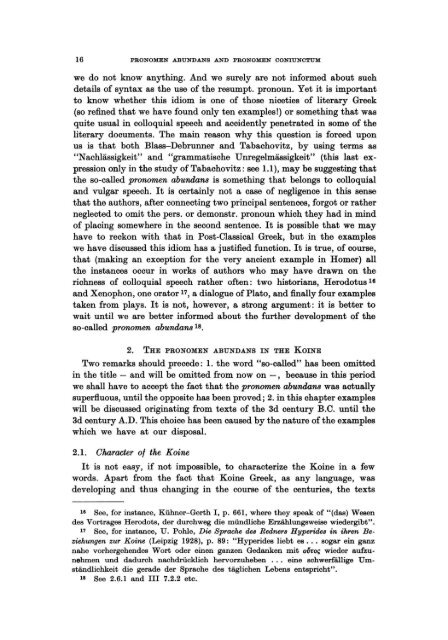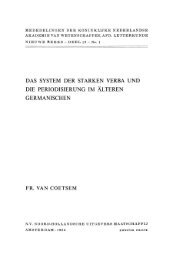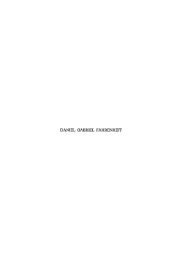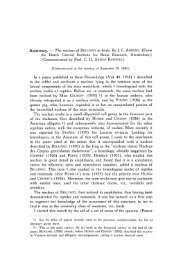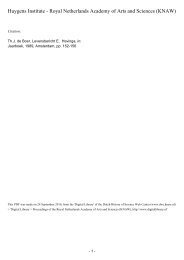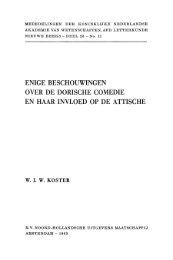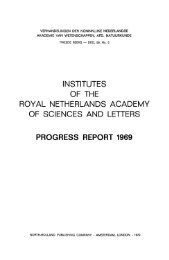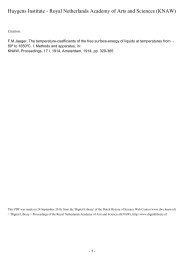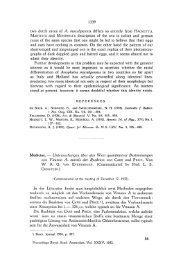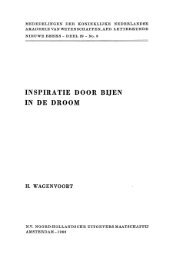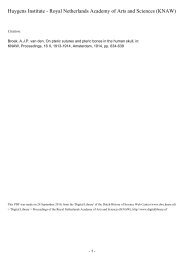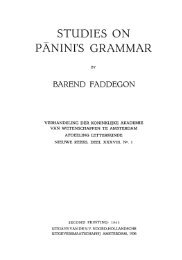Pronomen Abundans and Pronomen Coniunctum. A ... - DWC
Pronomen Abundans and Pronomen Coniunctum. A ... - DWC
Pronomen Abundans and Pronomen Coniunctum. A ... - DWC
You also want an ePaper? Increase the reach of your titles
YUMPU automatically turns print PDFs into web optimized ePapers that Google loves.
16 PRONOMEN ABUNDANS AND PRONOMEN CONIUNCTUM<br />
we do not know anything. And we surely are not informed ab out suoh<br />
details of syntax as the use of the resumpt. pronoun. Yet it is important<br />
to know whether this idiom is one of those nioeties of literary Greek<br />
(so refined that we have found only ten examples!) or something that was<br />
quite usual in oolloquial speeoh <strong>and</strong> aooidently penetrated in some of the<br />
literary documents. The main reason why this questiQn is foroed upon<br />
us is that both Blass-Debrunner <strong>and</strong> Tabaohovitz, by using terms as<br />
"Naohlässigkeit" <strong>and</strong> "grammatische Unregelmässigkeit" (this last expression<br />
only in the study of Tabachovitz: see 1.1), may be suggesting that<br />
the so-called pronomen abundans is something that belongs to colloquial<br />
<strong>and</strong> vulgar speeoh. It is certainly not a case of negligence in this sense<br />
that the authors, af ter conneoting two principal sentenoes, forgot or rather<br />
neglected to omit the pers. or demonstr. pronoun which they had in mind<br />
of placing somewhere in the second sentence. It is possible that we may<br />
have to reckon with that in Post-Classioal Greek, but in the examples<br />
we have discussed this idiom has a justified function. It is true, of oourse,<br />
that (making an exoeption for the very ancient example in Homer) all<br />
the instanoes ocour in works of authors who may have drawn on the<br />
riohness of oolloquial speeoh rather of ten : two historians, Herodotus 16<br />
<strong>and</strong> Xenophon, one orator 17, a dialogue of Plato, <strong>and</strong> finally four examples<br />
taken from plays. It is not, however, a strong argument : it is better to<br />
wait until we are better informed about the further development of the<br />
so-called pronomen abundans 18.<br />
2. THE PRONOMEN ABUNDANS IN THE KOINE<br />
Two remarks should precede: 1. the word "so-called" has been omitted<br />
in the title - <strong>and</strong> will be omitted from now on -, because in this period<br />
we shall have to accept the fact that the pronomen abundans was actually<br />
superfluous, until the opposite has been proved; 2. in this ohapter examples<br />
will be discussed originating from texts of the 3d century B.C. until the<br />
3d century A.D. This choice has been caused by the nature of the examples<br />
which we have at our disposal.<br />
2.1. Oharacter of the Koine<br />
It is not easy, if not impo88ible, to characterize the Koine in a few<br />
words. Apart from the fact that Koine Greek, as any language, was<br />
developing <strong>and</strong> thus changing in the course of the oenturies, the texts<br />
la See, for instance, Kühner-Gerth I, p. 661, where they speak of "(das) Wesen<br />
des Vortrages Herodots, der durchweg die mündliche Erzählungsweise wiedergibt".<br />
17 See, for instance, U . Pohle, Die Sprache des Redner8 Hyperides in ihren Beziehungen<br />
zur Koine (Leipzig 1928), p. 89: "Hyperides liebt es . .. sogar ein ganz<br />
nahe vorhergehendes Wort oder einen ganzen Gedanken mit oVroç wieder aufzunehmen<br />
und dadurch na.chdrücklich hervorzuheben ... eine schwerfällige Umständlichkeit<br />
die gerade der Sprache des täglichen Lebens entspricht".<br />
18 See 2.6.1 <strong>and</strong> III 7.2.2 etc.


